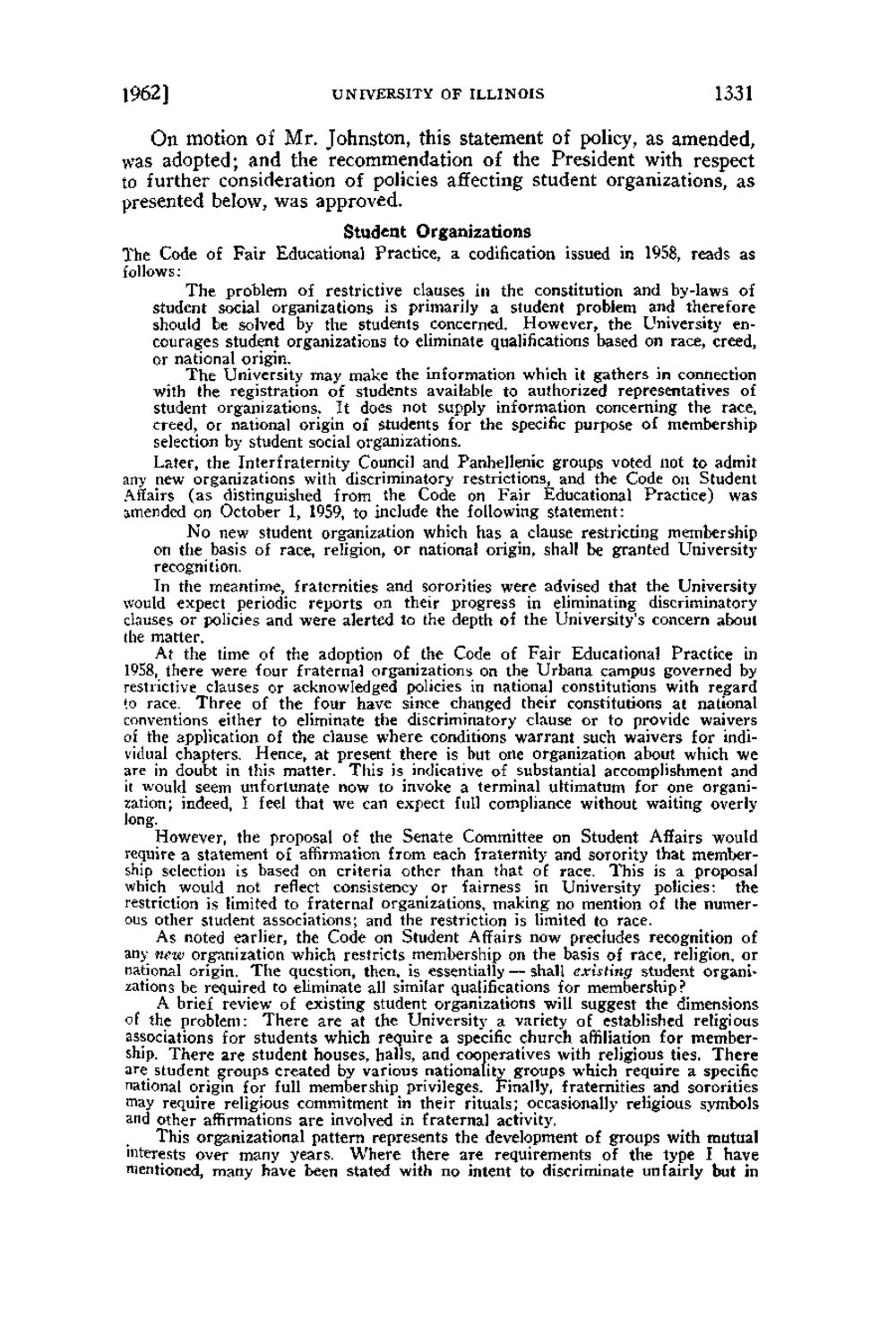| |
| |
Caption: Board of Trustees Minutes - 1962
This is a reduced-resolution page image for fast online browsing.

EXTRACTED TEXT FROM PAGE:
1962] UNIVERSITY OF I L L I N O I S 1331 On motion of Mr. Johnston, this statement of policy, as amended, was adopted; and the recommendation of the President with respect to further consideration of policies affecting student organizations, as presented below, was approved. Student Organizations The Code of Fair Educational Practice, a codification issued in 1958, reads as follows: The problem of restrictive clauses in the constitution and by-laws of student social organizations is primarily a student problem and therefore should be solved by the students concerned. However, the University encourages student organizations to eliminate qualifications based on race, creed, or national origin. The University may make the information which it gathers in connection with the registration of students available to authorized representatives of student organizations. It does not supply information concerning the race, creed, or national origin of students for the specific purpose of membership selection by student social organizations. Later, the Interfraternity Council and Panhellenic groups voted not to admit any new organizations with discriminatory restrictions, and the Code on Student Affairs (as distinguished from the Code on Fair Educational Practice) was amended on October 1, 1959, to include the following statement: No new student organization which has a clause restricting membership on the basis of race, religion, or national origin, shall be granted University recognition. In the meantime, fraternities and sororities were advised that the University would expect periodic reports on their progress in eliminating discriminatory clauses or policies and were alerted to the depth of the University's concern about the matter. At the time of the adoption of the Code of Fair Educational Practice in 1958, there were four fraternal organizations on the Urbana campus governed by restrictive clauses or acknowledged policies in national constitutions with regard to race. Three of the four have since changed their constitutions at national conventions either to eliminate the discriminatory clause or to provide waivers of the application of the clause where conditions warrant such waivers for individual chapters. Hence, at present there is but one organization about which we are in doubt in this matter. This is indicative of substantial accomplishment and it would seem unfortunate now to invoke a terminal ultimatum for one organization; indeed, I feel that we can expect full compliance without waiting overly long. However, the proposal of the Senate Committee on Student Affairs would require a statement of affirmation from each fraternity and sorority that membership selection is based on criteria other than that of race. This is a proposal which would not reflect consistency or fairness in University policies: the restriction is limited to fraternal organizations, making no mention of the numerous other student associations; and the restriction is limited to race. As noted earlier, the Code on Student Affairs now precludes recognition of any new organization which restricts membership on the basis of race, religion, or national origin. The question, then, is essentially — shall existing student organizations be required to eliminate all similar qualifications for membership? A brief review of existing student organizations will suggest the dimensions of the problem: There are at the University a variety of established religious associations for students which require a specific church affiliation for membership. There are student houses, halls, and cooperatives with religious ties. There are student groups created by various nationality groups which require a specific national origin for full membership privileges. Finally, fraternities and sororities may require religious commitment in their rituals; occasionally religious symbols and other affirmations are involved in fraternal activity. This organizational pattern represents the development of groups with mutual interests over many years. Where there are requirements of the type I have mentioned, many have been stated with no intent to discriminate unfairly but in
| |